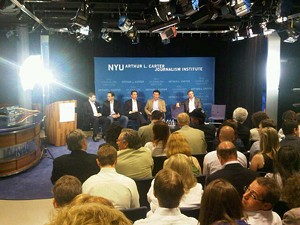The Media Oxpecker: The Future of Media Is "All White, All Male"
may 27, 2011 04:41 pm

VIEW OF THE FUTURE
Every Friday we round up media & tech industry news you may have missed while you were busy being subpoenaed by Maui authorities.
The announcement of I Want Media’s "The Future of Media" panel didn't go over as well as its organizers had hoped, coming under fire for organizing a panel without any females or people of color. (Gawker founding editor Elizabeth Spiers, now editor at the New York Observer, has since been quietly added to the list)
GOOD's Cord Jefferson suggested that the panelists themselves should boycott these events to send a message to the organizers:
After watching this happen again and again, something occurred to me: Why don’t the white men who are asked to engage in this nonsense simply stop doing it? The boycott is a protest with a long history of success. If white, male elites started saying, “I will not participate in your panel, event, or article if it is all about white men,” chances are these panels and articles would quickly dry up—or become more diverse.
David Carr, one of the panelists, largely agreed with Jefferson, telling him, “It’s obviously the right thing to do, but it’s also for our self-interest. I see it as a logic and a business issue.”
Should you hire a social media expert? HARO founder Peter Shankman says it's a waste of money:
Social media is just another facet of marketing and customer service. Say it with me. Repeat it until you know it by heart. Bind it as a sign upon your hands and upon thy gates. Social media, by itself, will not help you.
We’re making the same mistakes that we made during the DotCom era, where everyone thought that just adding the term .com to your corporate logo made you instantly credible. It didn’t. If that’s all you did, you emphasized even more strongly how pathetic your company was. You weren’t “building a new paradigm while shifting alternate ways of focusing customers on the clicks and mortar of an organizational exchange.” No -- you were simply an idiot who’d be out of business in six months.
Far more important than having a Facebook page or thousands of Twitter followers, Shankman says, is knowing your audience and reaching out to them.
Others disagree.
Over at the New York Times, social media editors took over the company's Twitter feed this week, previously automated, “in an experiment to determine if a human-run, interactive approach will be more effective.”
Zach Seward, who runs the Wall Street Journal's Twitter account, says this “experiment” by the Times is clearly the smarter approach:
The @WSJ account has been run by people since January 2010, Seward said. “The metrics went up considerably and almost immediately after switching from automated to personal. We’ve seen the same effect with several other accounts.”
“What we’ve seen by measuring it closely,” he said, “is that human-powered feeds do much, much better than automated ones, by any relevant metric.”
Liz Heron, one of the Times' aforementioned social media editors, clearly gets it:
We tell our journalists and encourage them to not just think about it as distribution and promotion. In fact, if you just think about it only as distribution, you’re not getting what you can out of social media, the most that you can, which is really about user interaction, engagement, and newsgathering.
They'll have to gain a lot of Twitter followers for their digital revenue to catch up to the print side. A New York Times print reader is worth 228 times as much as an online reader.
Twitter has acquired the TweetDeck application for over $40 million. On its corporate blog, the company said the move is an attempt to go after “the incredibly important audience of Twitter power-users.”
“Twitter has been my journalism school: the place where I’ve found mentors, debated theory and practice, figured out what I need to learn.”
There are currently 50 million likes per day for pages on Facebook.
How do Facebook social plugins affect traffic to company websites? A lot, according to, uh, Facebook.
Aol’s Patch sites have doubled their traffic this year.
Wired and GQ are the latest publications to begin offering iPad subscriptions.
Last week, we briefly addressed the woeful state of linking by the major news outlets and the New York Times' laughable assertion that they don't link out because their job is to create the “original source” to be linked to. Is part of the problem that they're using workflows and CMS's that are print-centric?

